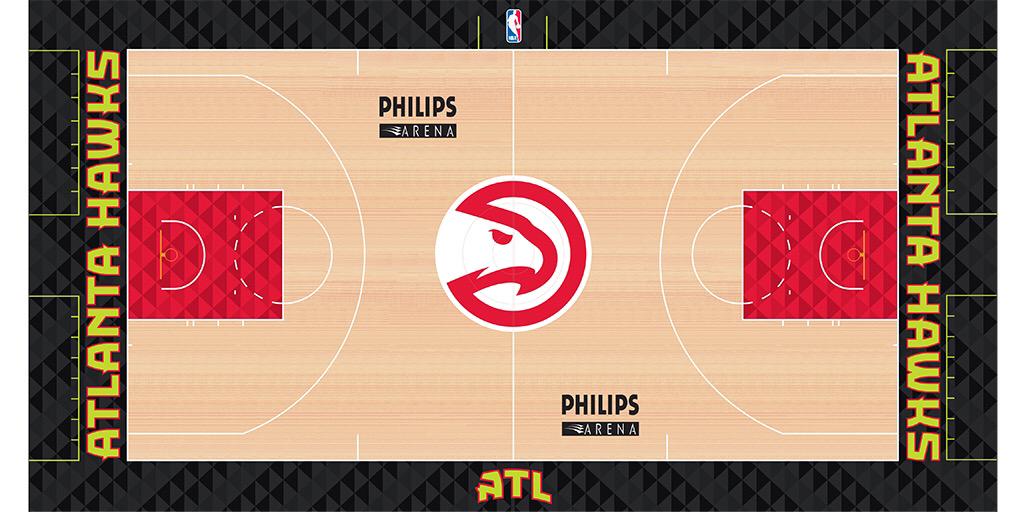The
Atlanta Hawks haven't asked
too much of
Dennis Schroder since selecting him in the 2013
NBA draft. Having just turned 22 years old, he's been viewed more as a developmental project. The bar has been moderately set over his first two years in the league.
It's time we raise it a few extra notches for 2016.
With expectations naturally higher, considering he's entering season No. 3, Schroder's importance to Atlanta has also never been greater.
It
needs him to take that next step and emerge as a bankable every-night weapon. The Hawks just lost DeMarre Carroll, along with the whole element of surprise that worked during last year's 60-win year (coming on the heels of only 38 wins in 2013-14).
Schroder actually had a solid sophomore campaign, averaging 10 points and 4.1 assists in 19.7 minutes. But it didn't all come in one steady stream of production.
Brad Mills-USA TODAY Sports
Still, expecting anything different would have been a little bit too demanding. Before 2014, Schroder had played just one full season in Germany's top league and one as a 13.1-minute-per-game rookie backup.
But the feeling around Schroder seems different this time around. He's just coming off a terrific showing at FIBA EuroBasket 2015, where he ran the show alongside
Dirk Nowitzki in a lead-guard role for the Germans.
"Dirk said the whole team is behind me, which is a great honor for me," Schroder told
DW.com's Jonathan Harding. "It's an honor to take it (the lead role) on."
Despite losing four of fives games (and missing a late game-tying free throw against Spain), Schroder was a standout performer throughout. He finished by going for 24 points and six assists against Turkey, 29 and seven against Italy and 26 and seven against Spain.
Schroder's Five Games at EuroBasket 2015
FG Pct. Points Rebounds Assists 3PT Pct. Turnovers
.481 21.0 4.6 6.0 .316 4.2
RealGM.com
Schroder looked more like a veteran than a prospect. He operated with visible confidence and an aggressive handle that allowed him to dictate possessions and create high-percentage shots.
Markus Schreiber/Associated Press
We saw Schroder abuse opponents off the hesitation dribble using some dangerous change of speed and direction.
Super quick and shifty, most of his NBA value ultimately lies within his ability to break down defenses. Last year, though, he played a lot less than the higher-profile point guards he beat out. Schroder ranked No. 1 in the league in points per 48 minutes on drives (minimum 50 games),
per NBA.com.
During EuroBasket, Schroder was also a terror in the pick-and-roll game, which he's frequently used in as a Hawk, though his success rate could have been better.
Of the 66 NBA players who registered at least 200 possessions as pick-and-roll ball-handlers in 2014-15, Schroder's .82 points per possession was just above the 0.79 average (
via NBA.com). For perspective, fellow Hawk Jeff Teague racked up 0.90 points per possession, while Lou Williams,
Chris Paul and
Stephen Curry led the way with numbers over 0.96.
Schroder could really stand to improve as an on-the-fly decision-maker. But he clearly has the potential to become one of the more proficient ball-screen guards, given his quickness, vision and pull-up jumper—a shot that's he's gotten more comfortable hitting.
Schroder raised his pull-up shooting percentage from
28.3 percent as a rookie to
38.9 percent in 2014-15. And it was working for him this past month over in Europe.
It's a key shot in the arsenal for Schroder, who's struggled finishing at the rim (
50 percent). The obvious next step is adding range to his jumper, though his 35.1 percent three-point mark from a season ago was a step in the right direction (23.8 percent as a rookie).
In terms of skills and fundamentals, it's tough to be too critical. But again, his decision-making remains fair game.
Schroder had the highest usage rate on the Hawks and the 10th-most win shares per 48 minutes, according to
Sports-Reference.com.
Given his strengths as a playmaker (and no real ability to play shooting guard), Schroder's style of play almost
requires him to dominate the ball, especially when he replaces Teague and has to run the second unit. Picking his spots with a little more poise would benefit Atlanta most next season.
Staying engaged at the defensive end will remain another priority for Schroder, who's flashed disruptive
tools—lightning foot speed and a 6'7¾" wingspan—just not the continuous high-IQ, high-motor play.
Schroder happened to have a few monster second-round playoff games against the
Washington Wizards before losing it in Atlanta's series with the
Cleveland Cavaliers. And he wasn't exactly held overly accountable for his ineffective play and the Hawks' collapse, which was rightfully chalked up as a result of inferior talent and poor team execution, among other things.
"Lack of talent, no superstars, lack of heart, lack of preparation, out-coached, out-played, out-efforted, the works," wrote
CBS Sports' Matt Moore.
Schroder's 2015 Playoffs
Minutes FG Pct. Points Assists 3PT Pct.
Second round versus Washington 20.8 .383 10.8 5.3 .357
Eastern Conference finals versus Cleveland 13.3 .333 5.8 2.5 .125
ESPN
But with more responsibility coming his way, Schroder will no longer go unmentioned after failing to show. His free pass has expired. The Hawks aren't contenders without him providing consistent firepower off the bench. Chances are they'll even have to bump up his minutes and play him alongside Teague—a move that could increase the third-year guard's efficiency by allowing him to make fewer in-game plays and decisions.
He represents the wild card for a team looking to build on a 60-win year and Eastern Conference Finals appearance. Not only does a breakout from Schroder help the Hawks get back to the top of the standings, it can enhance his image around the league as a potential starting NBA point guard.









